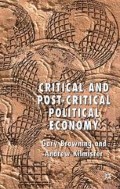Abstract
In Empire and Multitude: War and Democracy in the Age of Empire Hardt and Negri offer a radical reading of the contemporary world political economy and an agenda for revolutionary change. Their radicalism is presented as new. They perceive the contemporary world as operating in a novel way. Political power is no longer concentrated in states; state sovereignty has given way to imperial sovereignty. Hardt and Negri are theorists of globalisation, who take the contemporary world to function in a way that is distinct from its modern past. The power that states have harnessed and wielded and which has been criticised by preceding modern critics is no longer to be inspected and denounced from a standpoint that is situated outside the boundaries of the power exercised by states and empire. New imperial power is exercised globally and has no inside or outside. They observe,
There is a long tradition of modern critique dedicated to denouncing the dualisms of modernity. The standpoint of that critical tradition, however, is situated in the paradigmatic place of modernity itself, both ‘inside’ and ‘outside’, at the threshold of the point of crisis. What has changed in the passage to the imperial world, however, is that the border no longer exists, and thus the modern critical strategy tends no longer to be effective. (Hardt and Negri 2000, p. 183)
Access this chapter
Tax calculation will be finalised at checkout
Purchases are for personal use only
Preview
Unable to display preview. Download preview PDF.
References
Arthur, C.J. (1998) ‘The Infinity of Capital’, Studies in Marxism no. 5, 17–36.
Balakrishnan, G. (ed.) (2003) Debating Empire. London: Verso.
Barkawi, T. and Laffey, M. (2002) ‘Retrieving the Imperial: Empire and International Relations’, Millenium 31(1), 109–27.
Browning, G.K. (1998) ‘Infinity in Hegel and Marx’, Studies in Marxism no. 5, 1–16.
Bull, M. (2003) ‘You Can’t Build a New Society with a Stanley Knife’, in G. Balakrishnan (2003) Debating Empire. London: Verso.
Carver, T. (1998) The Postmodern Marx. Manchester: Manchester University Press.
Cohen, G.A. (1978) Karl Marx’s Theory of History: A Defence. Oxford: Oxford University Press.
Collingwood, R.G. (1999) The Idea of History. Oxford: Oxford University Press.
Deleuze, G. and Guattari, F. (1988) A Thousand Plateaus. London: Athlone Press.
Dyer-Witheford, N. (2005) ‘Cyber-Negri: General Intellect and Immaterial Labour’, in T. Murphy and A.-K. Mustapha (eds), The Philosophy of Antonio Negri. London: Pluto Press.
Hardt, M. (2000) Interview with Thomas Dumm, ‘Sovereignty, Multitudes, Absolute Democracy’, Theory and Event 4(3).
Hardt, M. (2005) ‘Into the Factory: Negri’s Lenin and the Subjective Caesura (1968–73)’, in T. Murphy and A.-K. Mustapha (eds), The Philosophy of Antonio Negri. London: Pluto Press.
Hardt, M. and A. Negri (2000) Empire. Cambridge, MA: Harvard University Press.
Hardt, M. and A. Negri (2004) Multitude: War and Democracy in the Age of Empire. London and New York: Penguin.
Hegel, G.W.F. (1976) Hegel’s Science of Logic. London: George Allen and Unwin.
Hegel, G.W.F. (1892) Lectures on the History of Philosophy. London: Paul, Trench and Trubner.
Hegel, G.W.F. (1956) The Philosophy of History. London: Dover Books.
Held, D. (1995) Democracy and the Global Order: From the Modern State to Cosmopolitan Governance. Stanford: Stanford University Press.
Held, D. (2004) Global Covenant: The Social Democratic Alternative to the Washington Consensus. Cambridge: Polity.
Held, D. and A. McGrew (2000) ‘The Great Globalization Debate’, in Held and McGrew (eds), Global Transformations Reader. Cambridge: Polity Press.
Held, D. and A. McGrew, D. Goldblatt and J. Perraton (1999) Global Transformations. Cambridge: Polity Press.
Hirst, P. and Thompson, G. (1996) Globalization in Question. Cambridge: Polity Press.
Laclau, E. (2004) ‘Can Immanence Explain Social Struggles?’ in P. A. Passavant and J. Dean, Empire’s New Clothes: Reading Hardt and Negri. London and New York: Routledge.
Lyotard, J.-F. (1992) The Postmodern Explained to Children: Correspondence 1982–1985. London: Turnaround.
Mandarini, M. (2003) ‘Translator’s Introduction’ in A. Negri Time for Revolution. New York and London: Continuum.
Marx, K. (1974) Grundrisse. Harmondsworth: Penguin.
Marx, K. and F. Engels (1976) The German Ideology. Moscow: Progress Publishers.
Murphy, T. and A.-K. Mustapha (eds) (2005a) The Philosophy of Antonio Negri. London: Pluto Press.
Murphy, T. and A.K. Mustapha (2005b) ‘Introduction’, in T. Murphy and A.-K. Mustapha (eds) (2005a) The Philosophy of Antonio Negri. London: Pluto Press.
Negri, A. (2000) Kairos, Alma Venus, Multitudo in A. Negri (2003) Time for Revolution. New York and London: Continuum.
Negri, A. (2004) Negri on Negri (with Anne Dufourmantelle and translated by M.B. DeBevoise). London and New York: Routledge.
Negri, A. (1997) The Constition of Time in A. Negri (2003) Time for Revolution. New York and London: Continuum.
Negri, A. (2003) Time for Revolution. New York and London: Continuum.
Ohmae, K. (1990) The Borderless World. London: Collins.
Passavant, P.A. (2004) ‘Introduction: Postmodern Republicanism’, in P. A. Passavant and J. Dean, Empire’s New Clothes: Reading Hardt and Negri. London and New York: Routledge.
Passavant, P.A. and Dean, J. (2004) Empire’s New Clothes: Reading Hardt and Negri. London and New York: Routledge.
Plamenatz, J. (1954) German Marxism and Russian Communism. London: Longmans.
Smith, T. (2003) ‘Globalisation and Capitalist Property Relations: A Critical Assessment of David Held’s Cosmopolitan Theory’, Historical Materialism 11(2), 3–35.
Surin, K. ‘“Now Everything Must be Reinvented”: Negri and the Revolution’, in T. Murphy and A.-K. Mustapha (eds), The Philosophy of Antonio Negri. London: Pluto Press.
Tormey, S. (2004) Anticapitalism. Oxford: One World.
Walker, R.B.J. (2002) ‘On the Immanence/Imminence of Empire’, Millenium 31(2), 337–49.
Author information
Authors and Affiliations
Copyright information
© 2006 Gary Browning and Andrew Kilmister
About this chapter
Cite this chapter
Browning, G., Kilmister, A. (2006). Hardt and Negri: Empire, Multitude and Globalisation. In: Critical and Post-Critical Political Economy. Palgrave Macmillan, London. https://doi.org/10.1057/9780230501522_9
Download citation
DOI: https://doi.org/10.1057/9780230501522_9
Publisher Name: Palgrave Macmillan, London
Print ISBN: 978-1-349-42765-9
Online ISBN: 978-0-230-50152-2
eBook Packages: Palgrave Political & Intern. Studies CollectionPolitical Science and International Studies (R0)

